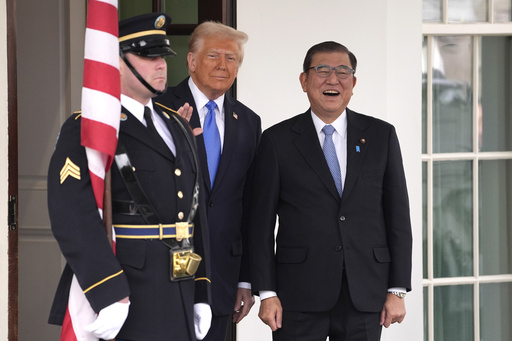WASHINGTON — On Friday, President Donald Trump expressed his intent to reduce the trade deficit with Japan during a meeting with Japanese Prime Minister Shigeru Ishiba at the White House. This meeting marked their first direct interaction since Ishiba took office. Trump noted that while tariffs were a possibility, he believed that the trade matters could be resolved amicably without resorting to such measures, highlighting the existing $68 billion trade deficit that the United States faces with Japan.
As their meeting commenced in the Oval Office, Trump conveyed optimism regarding Japan’s willingness to engage in fair trade practices, stating, “I think it will be very easy for Japan. We have a fantastic relationship. I don’t think we’ll have any problem.” As part of the discussion, a significant announcement was made regarding Nippon Steel’s decision to abandon its $14.1 billion bid to acquire U.S. Steel based in Pittsburgh; instead, it would focus on making an investment. Trump also mentioned his willingness to facilitate negotiations between the two companies as they navigate this investment process, albeit mistakenly referring to Nippon Steel as “Nissan,” a noted automaker.
Prior to this meeting, President Joe Biden had blocked the acquisition, citing national security concerns. Trump remained firm in his stance against foreign ownership of U.S. Steel, expressing his disapproval of such acquisitions. His campaign to address the trade deficit reflects a broader strategy that has included imposing tariffs on various countries as a means to bolster American industry.
During his brief trip to Washington, Prime Minister Ishiba emphasized his commitment to fostering a mutually beneficial trade relationship. He also highlighted that Japanese corporations have been significant contributors to foreign direct investment in the U.S. over the past five years and expressed Japan’s desire to increase its investments in America.
Ishiba praised Trump, recalling the image of the president showing resilience following an assassination attempt earlier in the summer. He noted that both Japanese politicians and the general public were enthusiastic about Trump’s return to office. “There are many that were anxiously awaiting your comeback,” Ishiba remarked, reflecting a broader sentiment among Japanese leadership and business circles.
The two leaders discussed ongoing security threats posed by North Korea, with Trump expressing his intention to rebuild his relationship with North Korean leader Kim Jong Un. He noted that during his initial term, the relationship with Kim was productive and suggested that it played a role in preventing conflict between the countries. However, he acknowledged that nuclear arms developments continued during that time.
At the press conference, Trump also mentioned his desire for accountability regarding the FBI’s handling of investigations into the January 6, 2021, Capitol attack, hinting at possible actions against certain agents he deemed corrupt.
In preparation for their meeting, Ishiba held discussions with notable business leaders, including executives from SoftBank and OpenAI, and sought insights from his predecessor, Fumio Kishida. He even reached out to the widow of former Prime Minister Shinzo Abe, seeking to strengthen the crucial relationship between Japan and the U.S.
Ishiba’s efforts to establish a strong bond with Trump come as he embarks on his role in a complicated geopolitical climate, particularly with the challenges posed by China’s influence in the Pacific and the risk of North Korean aggression. Senator Bill Hagerty noted that this meeting represents an essential opportunity for Ishiba to build on the close ties that characterized the first Trump administration. Their relationship overcame initial tensions regarding trade and defense spending and Simon’s close relationship with former Prime Minister Abe cemented important communications between the two nations.
Shinzo Abe’s tragic assassination in 2022 left a lasting impact, both on Trump and the geopolitical landscape. Their friendship, cemented through leisure activities like golf and personal dinners, illustrated a unique bond that had developed over time, easing earlier frictions as they collaborated. Trump recalled Abe fondly, expressing regret over his demise and recognizing the profound respect he held for him.
As Ishiba continues his diplomatic mission, he aims to nurture a collaborative atmosphere while addressing modern challenges faced by both the United States and Japan. The compact meeting was pivotal in reinforcing the trans-Pacific relationship that Ishiba seeks to sustain.
